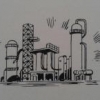Latest Downloads
-
 Water Bath Indirect Heaters
Water Bath Indirect HeatersArt Montemayor - Oct 12 2018 02:35 PM
-
 Petroleum: A Primer for Kansas
Petroleum: A Primer for KansasArt Montemayor - Oct 12 2018 02:27 PM
-
 Spray Tower for Flue Gas Scrubbing Design
Spray Tower for Flue Gas Scrubbing Designankur2061 - May 02 2018 02:31 PM
-
 Selection of Vertical Tanks
Selection of Vertical Tanksankur2061 - Apr 19 2018 07:42 AM
-
 Pressure Drop Calculator for Strainers 1
Pressure Drop Calculator for Strainers 1ankur2061 - Mar 24 2017 02:04 PM
-
 Horizontal Pig Trap System Design Guidelines
Horizontal Pig Trap System Design Guidelinesankur2061 - Jan 14 2017 02:54 PM
-
 Performance Prediction of 3-Stage Propane Refrigeration System
Performance Prediction of 3-Stage Propane Refrigeration Systemankur2061 - Aug 08 2016 02:43 PM
-
 Centrifugal Pump Troubleshooting Checklist
Centrifugal Pump Troubleshooting Checklistankur2061 - Dec 17 2015 08:18 AM
-
 Compressor Troubleshooting Checklist
Compressor Troubleshooting Checklistankur2061 - Sep 08 2015 11:43 AM
-
 Amine Sweetening Unit Preliminary Design
Amine Sweetening Unit Preliminary Designankur2061 - May 19 2015 09:35 AM
Popular Store Titles
 Tank Jacket Calculator
Tank Jacket Calculator
 Specification Sheet Collection
Specification Sheet Collection
 PIPESIZE
PIPESIZE
 Relief Valve Sizing
Relief Valve Sizing
 Rupture Disc Sizing
Rupture Disc Sizing
Chemical and Process Engineering Resources
Submitted Chris Haslego, Nov 21 2011 11:21 AM | Last updated Nov 21 2011 01:29 PM
| Category: | Preparing to Become an Engineer |
| Question: | I'm about to enter a chemical plant to do my summer internship, what advice would you offer? |
| Keywords: | advice,summer,intership |
| Answer: | Certainly look at the equipment. Ask for the equipment list and go around the plant and identify every single piece of equipment and spend some time with each piece of equipment. Gain an understanding of how it really works! In addition, learn as much as you can about how the industry works. For example, visit the Quality Control department and trace the flow of information. Read my feature article on SPC or Statistical Process Control and compare the methods I've discussed with how your plant operates. Gain an understanding of ISO9000 and ISO 14000 requirements (ask for a handbook)..be sure to put that on your resume too! Spend at least one week following around a process engineer because chances are that's where you'll start. Learn his/her daily routine. You should use this time to start to separate "how things are supposed to be done" from "how things are actually done". Learn about how the shipping works (what is required for products to leave the plant?). Oh, by the way...you'll want to start by learning the process of course, but that shouldn't take more than a few days (don't spend too much time on it). It would also be very beneficial to spend some time with the operators (the uneducated workers who really do things in the plant). Approach them with respect, remember that they don't understand WHY something would happen, but they do know that is WILL happen because they've seen it before. Explain why you're there and ask them if they mind some questions to help you learn. Ask them situational questions, "If the pressure gets to high in here, what can happen?", etc. Ask them what are the most common problems that occur with the process. You'll learn alot, and I commend you on trying to find out what to learn. Follow this advice and you'll really be prepared for your first job! |
| Links: | Article on Statistical Process Control |
Forum Quick Links
Tech Q & A Category List
-
 Bulk Solids
Bulk Solids
-
 ChE Outside the Plant
ChE Outside the Plant
-
 Chemical Process Business
Chemical Process Business
-
 Chemistry Basics
Chemistry Basics
-
 Corrosion
Corrosion
-
 Equipment Design
Equipment Design
-
 Experimentation and Testing
Experimentation and Testing
-
 Fluid Dynamics
Fluid Dynamics
-
 Heat Transfer Technology
Heat Transfer Technology
-
 Industrial Utilities
Industrial Utilities
-
 Mass Transfer
Mass Transfer
-
 Physical Property Information
Physical Property Information
-
 Plant Basics
Plant Basics
-
 Plant Economics
Plant Economics
-
 Preparing to Become an Engineer
Preparing to Become an Engineer
-
 Process Control
Process Control
-
 Reactions and Processes
Reactions and Processes
-
 Refining
Refining
-
 Safety
Safety
-
 Separation Technology
Separation Technology
-
 The Environment
The Environment
-
 Thermodynamics
Thermodynamics

 FB
FB



0 Comments